Book contents
- Frontmatter
- Contents
- Preface
- 1 Introduction
- 2 Keynes in the 1920s: ideas, beliefs, and events
- 3 Theories, implications, and conjectures in the 1920s
- 4 The General Theory: a different perspective
- 5 Monetary reform and international economic order
- 6 Other interpretations of the General Theory
- 7 Conclusion
- References
- Index
- Frontmatter
- Contents
- Preface
- 1 Introduction
- 2 Keynes in the 1920s: ideas, beliefs, and events
- 3 Theories, implications, and conjectures in the 1920s
- 4 The General Theory: a different perspective
- 5 Monetary reform and international economic order
- 6 Other interpretations of the General Theory
- 7 Conclusion
- References
- Index
Summary
Economists are inclined by training to minimize the importance of individuals and to be suspicious of explanations in which personal influence, persuasive argument, or powerful intellect have a dominant role. Impersonal forces, not persuasive individuals, shape the events that economists study. This training, and the strategy that goes with it, has proved itself repeatedly.
John Maynard Keynes is that rare exception – a man who influenced generations of economists and whose ideas and opinions affected the policies and political discussion of many countries in an important way long after his death. Keynes's ideas, and even more the ideas of those who claimed to be his intellectual heirs, dominated the textbooks and the scholarly journals for decades. His influence was strong both within and outside the areas to which he contributed directly. For example, his claim that a private economy was subject to instability encouraged research on the stability of competitive equilibrium and on the causes of business fluctuations. And his work on probability theory stimulated reconsideration of subjective probability.
Keynes died in 1946. Almost a generation later, a president of the United States, President Nixon, would declare that we are all “Keynesians” in our approach to policy. Keynes would not have been surprised. He had speculated on the role of ideas and, with his own ideas in mind, wrote:
The ideas of economists and political philosophers, both when they are right and when they are wrong, are more powerful than is commonly understood.
- Type
- Chapter
- Information
- Keynes's Monetary TheoryA Different Interpretation, pp. 1 - 16Publisher: Cambridge University PressPrint publication year: 1989

